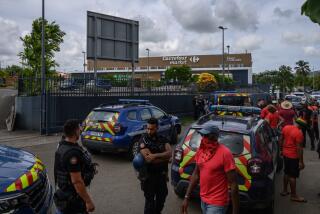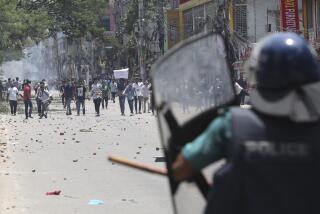Algiers Calm; State of Siege to Be Lifted Today
- Share via
ALGIERS — A state of siege in the Algerian capital was to be lifted today, six days after it was imposed to quell widespread rioting over food shortages and economic austerity measures, the government announced Tuesday.
A brief statement issued by President Chadli Bendjedid’s office said the state of siege would end at 6 a.m. local time today, following more than a day of calm throughout the capital.
Expanding on the announcement in response to questions, a government spokesman said the troops deployed throughout the city would be withdrawn, a nighttime curfew would be lifted and the military command that has governed Algiers since martial law was declared last week would be disbanded.
Lifting of the state of siege so soon after the rioting--in which more than 200 people are estimated to have died--came as a surprise to many observers here, who viewed the situation as still very tense.
A protest march by Islamic fundamentalists to the center of the city Monday ended in clashes in which more than 20 people are now said to have been killed.
The fundamentalists have also threatened to mobilize their supporters for another demonstration Friday, the Muslim sabbath. However, an address to the nation by Bendjedid on Monday night, in which he promised major political reforms, seems to have had the calming effect that was intended.
There were no further disturbances Tuesday, as shops began to reopen and activity in the city of 3 million people returned to normal. Soldiers in full battle dress were still deployed throughout the capital, but their mood had noticeably relaxed. Some were seen playing with small children, while others laughed and smiled at passers-by.
Diplomats in Algiers said they thought the government, which has been deeply shaken by the rioting, was now eager to prove that it was over. In doing so, however, it is taking a calculated gamble, the diplomats agreed.
“Nothing’s really changed. The problems that brought the rioters into the streets are still here. This place remains a tinderbox that could be ignited again by the slightest spark,” one Western diplomat said.
This impression was reinforced by what appeared to be a generally muted, if not hostile, reaction to Bendjedid’s speech. Despite efforts by the state-run media to drum up support for the speech, foreign reporters found nearly all of the Algerians they talked to in the capital to be deeply cynical about the president’s promises of reform.
Expressing sympathy with the demonstrators, Bendjedid promised Algerians that he will shortly introduce wide-ranging political reforms to make the government more responsive to their growing social and economic grievances.
However, he did not outline the reforms and was vague about when they would be introduced.
He said he sympathized with the plight of most Algerians, suffering from high unemployment, double-digit inflation and critical shortages of food and housing--the grievances that clearly motivated the riots.
But he promised no specific relief for these problems, other than to stress that their solutions lay in the economic reforms Algeria has already begun to implement.
“He said nothing,” a young Algerian said. “He said there would be change, but did not say what. He did not say anything about prices. He did not say anything at all. We are hungry, and we need more to eat than just words.”
This young man’s comment seemed typical of those of the few Algerians who were willing to talk to reporters.
Rage Changed to Fear
However, now that the army has proven willing to fire machine guns into crowds of protesting civilians and now that the state’s formidable and pervasive security apparatus is back in service, the rage of the past few days seems to have changed to fear.
Most of the people approached by reporters for reactions to Bendjedid’s speech refused to comment. Some, speaking in Arabic, which they thought that reporters would not understand, warned others that they would be arrested if they spoke to the journalists.
Unofficial reports suggested that as many as 3,500 people have already been arrested since the disturbances erupted Oct. 4, and rumors that many of them are being harshly mistreated are spreading throughout the capital.
Several diplomats said they believe the most critical moment for the government over the next few days will come when the public reacts to the funerals of those killed in the rioting.
Most of the bodies are still being held in the public morgues and are being released in stages for burial so as to minimize the public impact.
No official casualty figures have been released, and most unofficial estimates say there are 200 dead--with some setting the toll as high as 500.
More to Read
Sign up for Essential California
The most important California stories and recommendations in your inbox every morning.
You may occasionally receive promotional content from the Los Angeles Times.













